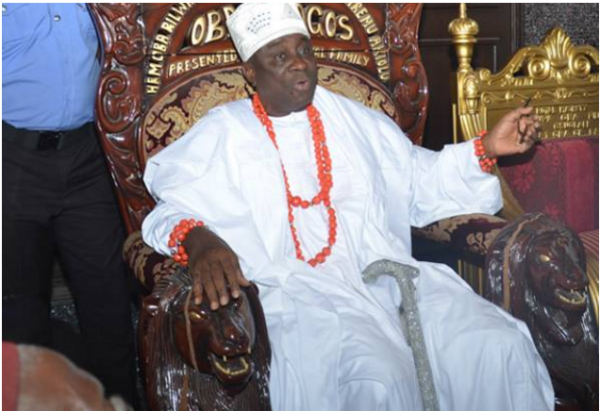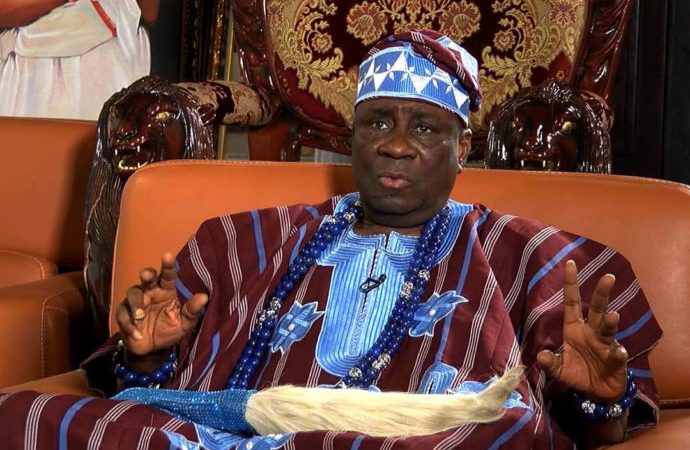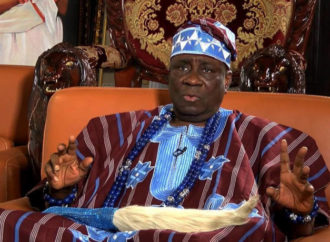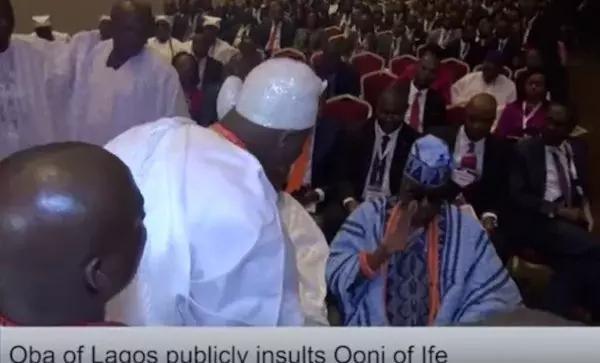ARTS & CULTURE
Battle For Lagos Throne: I’m The Rightful King, Oba Akiolu Tells Court
Published
8 years agoon
By
Reporter
Oba of Lagos, Rilwan Akiolu on Tuesday insisted before an Ikeja High Court that he remains the rightfully elected monarch of Lagos.
This he disclosed at the resumed hearing of a suit challenging his right to the throne as Oba of Lagos.
The News Agency of Nigeria (NAN) reports that on May 22, 2017 the last adjournment day which was a day to the 14-year anniversary of his coronation on May 23, 2003 as the Oba of Lagos, Akiolu, citing historical sources, had told the court that he is the bona fide monarch of the state.
Akiolu’s title is being challenged by Prince Adedoyin Adebiyi and Prince Rasheed Modile who are both of the Akinsemoyin Ruling House of Lagos.
NAN also recalls that Adebiyi and Modile were candidates chosen by the Akinsemoyin Ruling House to contest the Obaship title in 2003 after the demise of Oba Adeyinka Oyekan, the then Oba of Lagos in 2003.

They lost the race to Akiolu who they alleged had no rightful claim to the throne.
Joined in the suit as respondents are the state governor and the Attorney-General of Lagos State, Prince Awobade Pearse,
Others are the representative of the Ologun Kutere Ruling House and Chief J.J Junaid – Eko and the head of the traditional white cap chiefs of Lagos.
Other respondents include Prince Kola Balogun and Mr Musibau Kelani, who are the respectively the Head and Secretary of the Eshilokun Royal Family.
While being cross examined by Mr Babatunde Fashanu (SAN), Akiolu reasserted that the age-long traditional customs and traditions were followed in his selection as an oba.
Responding to claims that he was elected less than 90-days after the demise of Oyekan which is contrary to customs, Akiolu said that such a rule was non– existent.
“There have been 21 Obas of Lagos before the late Oba Oyekan, in the Lagos State selection of Obas, there is no 90-day rule.
“By the grace of God, I am a lawyer, I am duty bound to speak the truth, I have a duty to assist the court.
“The 90-day rule does not exist in the selection of Obas,”he said.
Akiolu disputed the claims of Adebiyi and Modile that he was not a descendant of Oba Ologun Kutere, a former Oba of Lagos who reigned from the late 1700s to the early 1800s.
“Oba Ologun Kutere had five children, one of which was Akiolu, Akintoye was the last child and Akiolu and Olusi were the older children.
“Akintoye was three months old when Oba Ologun Kutere died, I don’t know how old Akiolu was when his father died.
“By the grace of God, I am a direct descendant of Akiolu Ologun Kutere.”
When asked by Fashanu to state in order of seniority, the children of Oba Ologun Kutere, Akiolu retorted “I don’t know, I don’t work at the births and deaths registry.
“What is important is that Akiolu is the child of Ologun Kutere.
“There have been three members of the Akiolu family who ran for the Oba of Lagos including an Akiolu family member known as Baba Ita-Ado, I can’t remember when he ran and I cannot tell lies.
“All Lagos princes who have no curse placed on them are entitled to run for the kingship, it is however the prerogative of the king makers to choose who will be king.
“Many are called, few are chosen,” he said.
Akiolu noted that his being capped as Oba during his coronation ceremony by a representative of the Eleboro family was not illegal despite the fact that it was not presided over by Chief Eleboro, who personally caps Obas of Lagos.
“Contrary to claims that in the history of Lagos, no Oba has been capped by any person other than Chief Eleboro, Oba Adeniji Adele was capped by Chief Gafir.
“The Eleboro family capped me,”he said.
Akiolu denied holding grudges against individuals who he allegedly disliked by preventing them from succeeding him as the monarch in future.
“The claimants had wanted to meet with me somewhere to sign a document regarding the succession but I refused.
“It is not an individual position; it belongs to the past, present and future.
“All human beings should not hate each other, we are equal in the eyes of God but not equal in our love for God,”Akiolu said.
Justice Adebowale Candide-Johnson adjourned the case until July 5, 6 and 11 for continuation of trial.
You may like
-


Nobody Can Take Away Lagos From APC – Oba Of Lagos
-


Lagos Is Not Part Of Yorubaland – Oba Akiolu
-


“There Is No Quarrel Between Me And The Ooni of Ife.” – Oba Of Lagos, Oba Akiolu
-


Ooni Of Ife Reacts To Getting Snubbed, Says He Will Continue To Respect Oba Akiolu
-


Oba Akiolu of Lagos Snubs Ooni of Ife In Public
ARTS & CULTURE
Ijele Masquerade: The “King Of Masquerades” In Igbo Land
Published
4 months agoon
December 21, 2024By
wpadminee
The Ijele Masquerade, often referred to as the “King of Masquerades,” holds a revered position in Igbo culture. It is not only the largest masquerade in Africa but also a symbol of unity, spirituality, and cultural identity among the Igbo people.
Its towering presence, vibrant artistry, and profound symbolism make it a centrepiece of Igbo traditions.
The Ijele Masquerade originated in southeastern Nigeria, particularly in Anambra and Enugu states. Oral traditions trace their roots to the Akwunechenyi dance group in Umueri.
It began as a celebratory and protective figure, initially created to intimidate invaders and celebrate royalty. Over time, it evolved into a cultural icon representing greatness and the Igbo people’s connection to their ancestors.
Standing between 12 and 15 feet tall, the Ijele Masquerade is a marvel of craftsmanship. It is constructed from bamboo, colourful fabrics, and intricate carvings.
Its structure is divided into two segments: the upper (Mkpu Ijele) and the lower part (Akpakwuru Ijele), separated by a symbolic python figure, Eke-Ogba.
This design signifies the balance between the spiritual and earthly realms. The preparation of the masquerade requires extensive collaboration, with over 100 men working for six months to complete its elaborate design.
Cultural and Spiritual Significance of Ijele Masquerade
The Ijele Masquerade embodies the collective spirit of the Igbo community. It is a representation of the ancestors’ guidance, protection, and blessings.
Traditionally performed during festivals, burials, and special ceremonies, the Ijele is believed to have spiritual powers, such as warding off evil spirits, promoting fertility, and bringing healing.
Its performance is both a spectacle of entertainment and a deeply spiritual ritual that connects the living to their heritage.
The Ijele Masquerade is a highlight of Igbo cultural festivals, often serving as the grand finale. Accompanied by music, drumming, and traditional dances, its performance captivates audiences with its grandeur and artistry.
These events also serve as a platform for preserving and promoting Igbo heritage, attracting tourists, and generating economic benefits for the community.
Challenges Facing Ijele Masquerade
Despite its cultural significance, the Ijele Masquerade faces challenges in the modern era. Urbanisation, globalisation, and declining interest among younger generations threaten its preservation.
The elaborate nature of its preparation also requires significant funding and resources, which are often scarce. Additionally, cultural appropriation by outsiders risks diluting its authenticity and significance.
Efforts to preserve the Ijele Masquerade have gained international recognition. In 2009, UNESCO listed it as an intangible cultural heritage in need of safeguarding.
This recognition highlights the importance of supporting local communities to maintain their traditions. Advocacy for funding, education, and tourism initiatives is vital to ensuring the continuity of this cultural treasure.
A Symbol of Igbo Identity
The Ijele Masquerade remains a powerful symbol of Igbo identity and resilience. It is a testament to the creativity, spirituality, and unity of the Igbo people.
As it continues to inspire pride and admiration, the Ijele Masquerade underscores the importance of preserving cultural heritage in a rapidly changing world.
By supporting initiatives that promote Ijele, individuals and organisations can help sustain this remarkable tradition for future generations.
Its legacy is not only a source of pride for the Igbo people but also a significant contribution to the global appreciation of cultural diversity.
For further details about the Ijele Masquerade, see sources like UNESCO’s Intangible Cultural Heritage listing and articles exploring its cultural significance.
Read more on culture here.
ARTS & CULTURE
Does Anklet Really Signify Promiscuity?
Published
5 months agoon
December 7, 2024By
wpadminee
What is an anklet?
An anklet is a versatile piece of jewellery that women typically wear around their ankles. Crafted from materials like chains, beads, or a mix of both, anklet meanings vary across cultures and styles.
Many fashionable women choose anklets to make a bold style statement, embracing their elegance and charm.
In Nigeria, people often call this accessory a “leg chain” or “ankle chain,” reflecting its cultural relevance. In pop culture, it’s popularly known as an “ankle bracelet.”
Anklets here focus more on fashion than symbolism, though interpretations can differ. With various styles and intricate designs available, anklets offer countless aesthetic options, allowing women to showcase their personal flair.
Ultimately, anklet meanings can be deeply personal, influenced by tradition, culture, or simply individual taste.
Cultural and Historical Significance
Throughout history, anklets have held different meanings across various cultures. While some view them as mere adornments, others have associated them with deeper, sometimes controversial, connotations.
In some societies, ancient and modern, anklets symbolise promiscuity.
Early Usage in Ancient Civilisations
Egypt is often credited as the birthplace of anklets, but India played a significant role in their widespread acceptance. In India, anklets were part of traditional attire, known as pattilu, payal, or nupu.
These terms also include Paujinupur and padapadma. Early Indian literature, such as the first-century epic Silappatikaram, mentions anklets, highlighting their cultural importance.
Rajasthani women were known for their elaborate anklet designs, reflecting regional traditions.
Among the Odisha people, gold anklets were once reserved for warriors, while brides included them as part of their wedding regalia.
Married women often wore anklets to signify their marital status, and dancers used those with dangling bells to enhance their performances.
Similarly, in ancient Egypt, anklets indicated social status. Wealthy women wore gold anklets, while silver or leather versions were common among slaves and the poor.
These accessories, known as menefret or kholkai, reflected one’s place in the social hierarchy. Interestingly, some accounts suggest that anklets were linked to temple worshippers and even prostitutes, though these claims remain largely unverified.
Modern Evolution and Symbolism
Over time, the meaning of anklets has evolved significantly. In the 1970s, during America’s “sexual revolution,” anklets became symbols of female empowerment and liberation.
This era emphasised women’s freedom to express themselves, including their sexuality. Consequently, anklets began to carry connotations of promiscuity, especially within the “hotwife” culture.
The “Hotwife” Phenomenon
A “hotwife” refers to a married woman who engages in consensual extramarital relationships with her husband’s approval. Various anklet symbols reflect this dynamic:
- Two male symbols and one female symbol: Indicate openness to relationships with men of any race.
- Queen of spades: Represents a preference for Black men.
- Heart symbol: Suggests a happy marriage that includes mutually beneficial intimate relationships outside the primary partnership.
- The key to happiness: Denotes a marriage where the husband’s extramarital activities are contingent on his wife’s consent.
Anklets in Contemporary Nigerian Fashion
Today, many Nigerian women wear anklets purely for their aesthetic appeal, often unaware of the historical or cultural associations. For them, anklets are fashion accessories, not symbols of promiscuity or class distinction.
Despite lingering societal judgments, especially within conservative African contexts, it’s essential to recognize that fashion choices are personal.
Women should not face harsh criticism for wearing anklets, as these judgments stem from outdated or culturally irrelevant perspectives.
In conclusion…
Anklets are versatile fashion pieces that have transcended their historical roots. While some cultural connotations persist, modern women wear anklets to express their style and individuality.
It is crucial to separate fashion from judgement and allow women the freedom to make their own choices about their bodies and accessories.
Let’s appreciate anklets for what they are today: beautiful, empowering symbols of self-expression.
Read more articles here.
AFRICAN
The Only 4 African Countries That Have Won Miss Universe Title
Published
5 months agoon
December 7, 2024By
wpadminee
While many African countries have sent representatives to the pageant, only a few have managed to clinch the coveted Miss Universe crown.
The Miss Universe pageant is one of the most prestigious beauty pageants worldwide. It has been a stage for countless beautiful women to showcase their elegance, intelligence, and talent.
1. South Africa
South Africa is the African country with the most Miss Universe wins. This stunning nation has produced four Miss Universe winners:
- Margaret Gardiner (1978)
- Demi-Leigh Nel-Peters (2017)
- Zozibini Tunzi (2019)
- Andrea Meza (2020)
These South African beauties have not only captivated the world with their beauty but have also used their platforms to advocate for important social causes.
2. Namibia
Namibia, a small country in Southern Africa, has also made its mark on the Miss Universe stage.
- Michelle McLean won the Miss Universe title in 1992.
This stunning Namibian beauty brought pride to her nation and continues to be an inspiration to many.
3. Angola
Angola, a country rich in culture and natural beauty, has also produced a Miss Universe winner.
- Leila Lopes was crowned Miss Universe in 2011.
Her win marked a significant moment for Angola and showcased the beauty and talent of African women.
4. Botswana
Botswana, a landlocked country in Southern Africa, may be small, but it has produced one of the most iconic Miss Universe winners.
- Ntsepa Motsepe won the Miss Universe title in 1999.
Her win was a surprise to many, but it solidified Botswana’s place in the pageant world.
These four African countries – South Africa, Namibia, Angola, and Botswana – have proven that African beauty is truly global.
They have inspired countless young women across the continent and beyond to dream big and pursue their passions.
As the Miss Universe pageant continues to evolve, we can only hope to see more African countries adding their names to this prestigious list.
Check here for more articles.
Latest


Samsung Galaxy S25 Series Sets The Standard Of AI Phones As A True AI Companion
Samsung Galaxy S25 series sets the standard of AI phones as a true AI companion …Pioneering the multimodal era with...


5 Things To Expect In Afrobeats In 2025
Afrobeats is poised to reach unprecedented heights in 2025 as Nigerian music continues its remarkable global ascent. The genre’s explosive...


Here Are The 7 Most Ancient Countries On Earth
The oldest countries in the world stand as remarkable testaments to human civilisation, each containing landscapes and monuments that narrate...


Why Self-Reflection Is More Important Than Resolutions
Millions of people embark on a yearly ritual: they sit down with a notebook and pen, eager to craft a...


Nollywood Director, Kemi Adetiba Teases King Of Boys 3
Nollywood director Kemi Adetiba has revealed that another instalment of King of Boys will be released on December 25, 2025....


John McEnroe Says He Can Be The Commissioner Tennis Needs Amid Doping Crisis
Recent doping controversies involving top players have not damaged tennis’s reputation, but John McEnroe believes that appointing a single commissioner...


“Everybody Loves Jenifa” Becomes Nollywood’s Highest-Grossing Film Of All Time
Nollywood filmmaker Funke Akindele has achieved a historic milestone with her latest film, “Everybody Loves Jenifa.” The film has officially...


FG To Premiere TV Series, “Hidden Riches” On Mining Sector On January 25
Nigeria’s Federal Government will launch an ambitious television drama series focused on the nation’s mining sector, premiering “Hidden Riches” on...


Qing Madi Delivers A Soulful Performance Of “Favourite Pyscho”
Rising Afro-RnB sensation Qing Madi launches into 2025 with a mesmerising performance on the prestigious COLOURS platform, showcasing her latest...


Taiwo Awoniyi’s First Goal Of The Season Seals Nottingham Forest’s Win Over Wolves
Taiwo Awoniyi made a triumphant return to Premier League action. He scored in stoppage time to help Nottingham Forest crush...
-Ad-




